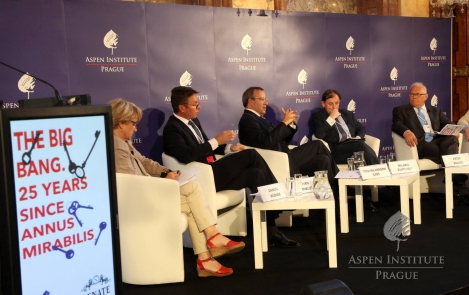-
Reset
+


President Ilves: we have a European Union that is free, but not united
10.06.2014
The recent credit crunch and the current crisis in Europe reveal the lack of solidarity in the European Union and our weakness in standing up for democratic values and ensuring security. So said the President, Toomas Hendrik Ilves, during one of the panels of the annual conference of the Aspen Institute Prague. The conference focused on analysing global policies post 1989 and the influence of the communist past on Europe's position today.
President Ilves stated that the fall of the Berlin Wall and collapse of communist regimes in Eastern Europe 25 years ago, NATO's enlargement towards the East 15 years ago and the enlargement of the European Union 10 years ago were all fundamental events that were inspired by an idealised idea of a united Europe.
"As we consider where we stand today, 25 years later, it seems, first of all, that the freedom of speech and liberal market economy are seen as a self-evident background for our everyday operations and proceedings. I emphasise as another aspect that the recent economic crisis did not divide the European Union into so-called new and old member states, but into rule-abiding and irresponsible member states instead," President Ilves commented.
"A reality, much more complicated than the ideals had established, has been revealed after the collapse of the Berlin Wall," stated the Estonian Head of State. "The One Europe dream has turned out to be an illusion."
According to the Estonian Head of State, the weakness of Europe in standing up for common values has also now become evident, against the background of the current Ukrainian crisis, initiated and encouraged by Russia, which has in general challenged the West to face up to the new situation. President Ilves told the audience that in this change Europe, the democratic West is still unable to decide, collectively and in unison, how it should respond.
The European Union must not be afraid of taking powerful steps, which will mean, among other things, imposing sanctions on Russia, which has violated international law and Ukraine's territorial integrity by military force, added the Estonian Head of State.
He also emphasised the importance of abiding by a common security policy. "The European Union must abandon its occasional indifference and adopt a more serious attitude towards consistently ensuring the security of us all."
Alongside the Estonian Head of State, Polish economist and politician Danuta Hübner, former Minister of Foreign Affairs of Hungary Péter Balázs, former Minister of Finance of Slovakia Ivan Mikloš, Ukrainian journalist and political analyst Mykola Riabchuk and the President of the Aspen Institute Prague, Michael Žantovský, took part in the exchange of ideas about the current policies in Europe.
President Ilves also delivered the opening address last night at the conference gala, where the Aspen Prague Award was given to the former Secretary of State of the United States of America, Madeleine K. Albright.
The Aspen Institute Prague is a Central European non-ideological platform for policy innovation and inclusive dialogue that facilitates the exchange of ideas, fosters open society and promotes value-based leadership by organising international conferences and publishing various publications. This year's conference is called "The Big Bang: 25 Years Since Annus Mirabilis".
Today, the Head of State will also pay a visit to the office of Radio Free Europe and take a plane to Rome to participate in a panel focusing on challenges faced by Europe at the annual meeting of the European Council on Foreign Relations.
Office of the President
Public Relations Department
Phone +372 631 6229



